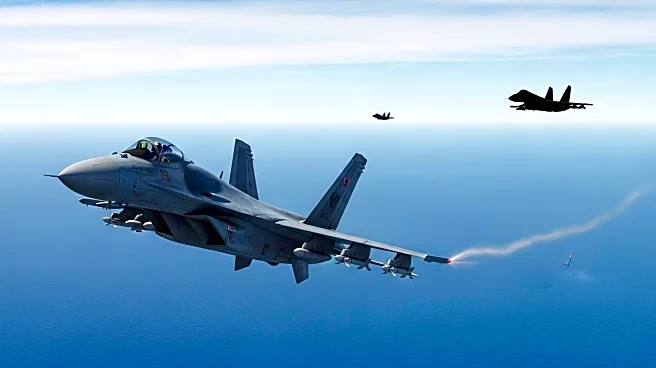What's Happening?
On Sunday, two German Eurofighter jets were dispatched to intercept a Russian Il-20M reconnaissance aircraft over the Baltic Sea. The Russian plane had reportedly turned off its transponders and ignored communication attempts, prompting Germany's air force to take action from the Rostock-Laage airbase. This incident is part of escalating tensions between NATO and Russia, following recent violations of Estonian airspace by Russian MiG-31 fighters. Estonia has condemned these actions and plans to convene an emergency UN Security Council meeting. The situation is further complicated by reports of Russian drone activity in Poland and a deadly Ukrainian drone attack in Crimea.
Why It's Important?
The interception of the Russian aircraft by German jets highlights the increasing military tensions between NATO and Russia. Such provocations could lead to heightened security measures and diplomatic responses from NATO member countries. Estonia's call for an emergency UN Security Council meeting underscores the seriousness of the situation, as regional security is threatened. The broader implications include potential shifts in NATO's defense strategies and international relations, particularly concerning the ongoing conflict in Ukraine. The incident also raises concerns about Russia's intentions and the possibility of further escalations.
What's Next?
Estonia's request for consultations under NATO's Article Four suggests that member countries may soon convene to discuss collective security measures. The upcoming UN General Assembly in New York could serve as a platform for addressing these tensions and seeking diplomatic solutions. Additionally, European governments may need to reassess their defense postures and readiness in response to Russia's actions. The situation could lead to increased military presence and surveillance in affected regions, as well as potential sanctions or diplomatic efforts to deter further provocations.
Beyond the Headlines
The ongoing tensions between NATO and Russia could have long-term implications for global security dynamics. The pattern of Russian provocations may be aimed at testing NATO's resolve and unity, potentially leading to shifts in alliance strategies. The situation also highlights the importance of international cooperation and dialogue in preventing conflicts and maintaining regional stability. Furthermore, the incident raises ethical questions about the use of military force and the balance between national security and diplomatic engagement.










